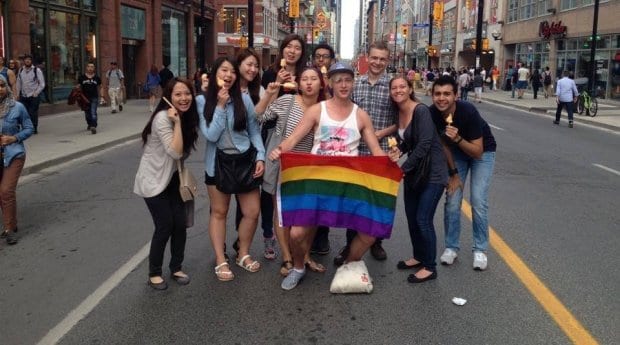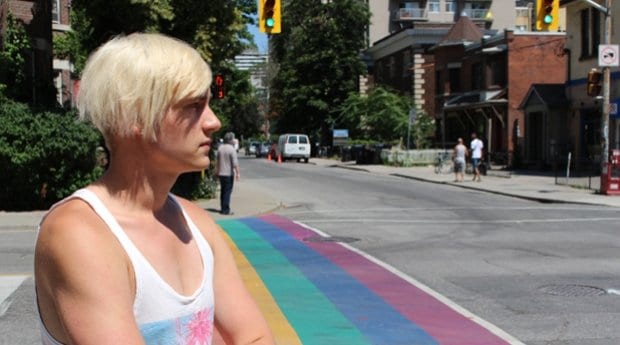
Romanov celebrates WorldPride 2014 in Toronto. Credit: Justin Romanov
The situation for gay youth in Russia is the focus of a powerful new documentary called Children 404. In the above video, Justin Romanov, who is profiled in the film, talks about the documentary, his experiences in Russia and his new life in Toronto. Children 404 made its Canadian premiere at Hot Docs in spring 2014.
Justin Romanov has a habit of whistling Canada’s national anthem. He’s proud to be living here.
“I was born in Russia, but my mind is Canadian,” says the 19-year-old, who is studying English in Toronto. In 2014, he moved to Canada from the small Russian town of Ulyanovsk, where he faced homophobia, discrimination and violence because of his sexuality. He’s living a completely different life now.
“In Canada, I feel human. I feel equal. In Russia, I’ll always be different. People there hate me just because I’m gay. They don’t see how I’m studying or my skill set,” he says. “They just see that I’m gay. In Toronto, it’s a lot different. I feel open and equal. It’s like a fairy tale. In Russia, it’s hell.”
In September, Romanov will attend a hearing to learn whether he will become a permanent resident and keep his fairy tale alive. He spent hours writing his life story for the immigration office. He has teamed up with lawyer and human rights activist El-Farouk Khaki, who edited and submitted all Romanov’s documents for review.
“If the immigration officer believes I’m gay and I cannot go back to Russia, I will stay in Canada. Or he will tell me I should go back to Russia,” Romanov says. “I think I have a good chance, because I’m gay and I do a lot of LGBT activism.”
Romanov’s story is told in Children 404, a documentary about Russian teens affected by President Vladimir Putin’s law forbidding “gay propaganda.” Romanov was holding a rainbow blanket at a political protest in Moscow when a filmmaker focused his camera on him. After the protest, directors Pavel Loparev and Askold Kurov spent three hours talking with Romanov, and the idea to make Children 404 was born.
Romanov has continued to be visible since coming to Toronto. He recently appeared on the cover of Now magazine’s WorldPride issue and he marched in the WorldPride parade. He hopes his activism brings more awareness for gay teens in Russia. He says the situation is so bad that three of his friends committed suicide this year. Because of the lack of money and support, fleeing Russia isn’t an option for most LGBT teens.
“Most gay teenagers in Russia don’t have money, or their families don’t support them because they’re gay,” he says. “Gay teenagers cannot come [to Canada] because they can’t get jobs; they don’t have money or education. How can they work? How can they make money if they are gay in Russia?”
His mother paid $11,000 for the student visa that secured her son’s journey to Canada. She had to sell her home to get the money, and she now rents a single room. But she wasn’t always so supportive, which is what pushed Romanov into activism.
“My activism started when I came out to my parents because they didn’t understand me. I started doing LGBT activism because I want people to understand who I am, who gay people are,” he says. “I feel afraid because in that society, everyone told me it’s abnormal to be gay. It’s sick. It’s propaganda. One day, when I was 14, I woke up and said, ‘No, I’m gay. I was born gay. It’s normal. I cannot change.’”
When Romanov told his parents, they stopped speaking to him and took away his phone and computer. They believed the internet turned him gay. His aunt took him to a psychologist and asked him if he was a top or bottom. She said he couldn’t be a top because “gays are just people who live in prison and bottom.”
“I was 14 years old and it was a big shock. Being gay is not just sex — it’s relationships, how I feel about other people — and she tried to change my mind.”
Romanov continued his journey by coming out at school. His peers harassed him relentlessly and labelled him a “fag,” as seen in Children 404. He stopped going to gym class because other students would beat him. But it wasn’t just in school that he faced physical abuse.
“Back in Russia, I went with my friend to some restaurant, and security took me outside and beat me because I’m gay. We called the police, but they did nothing. It’s only when we call a lawyer or a human rights organization that they try to do something. I was beat by four people, but they arrested one guy and he was held for only three days,” he says.
He’s almost finished the program at his ESL school, where he’s trying to make changes to benefit future students. He says he spoke with his principal about adding some diversity to the curriculum.
“I want equality. Like religion, we need to be talking about sexual orientation, too, because people from different countries come to Canada to study English, and we need to be talking about it. We always learn how a man and a woman make a family but never a man and another man, so I think it’s discrimination,” Romanov says. “I know some Saudi Arabian guys and some Russian guys who are afraid to be open. I want everyone to feel free and equal.”

 Why you can trust Xtra
Why you can trust Xtra


